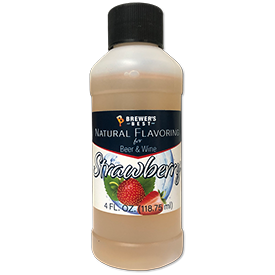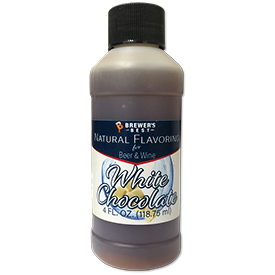The Art of Infusion: Natural Flavorings and Their Transformative Powers in Brews and Vintages
Posted by Matteo Lahm on 22nd Jan 2024
Natural flavorings are the equivalent of the spice rack of the brewing and winemaking world. They are derived from plant sources, like fruits, herbs, spices, and even certain types of wood. They are extracted through various methods such as distillation, fermentation, or cold pressing. Each source contributes its unique profile to your final product, adding layers of complexity and depth to the flavor. Do you use them? Let’s talk about how you can and should.
Before addressing how natural flavors can bring your brews and vintages to another level, let’s talk about how they are made. The extraction of these natural flavorings is a meticulous process, often involving methods such as distillation, fermentation, or cold pressing. Distillation, for example, involves heating a plant material to create steam, which then cools down to form a concentrated liquid full of flavor. Fermentation, on the other hand, involves the use of yeast or bacteria to break down plant materials, releasing their flavors. Cold pressing, typically used for citrus fruits, involves mechanically squeezing the plant material to extract its flavorful oils.
Now, let's delve into the world of terpenes. Terpenes are organic compounds found in a wide variety of plants, and they're responsible for their distinctive flavors and aromas. They're the reason why your beer can have floral notes, or why your wine can have a hint of citrus. In the brewing and winemaking process, terpenes are extracted from the plant material and infused into the product, adding a new dimension to its flavor profile. From the piney taste in your IPA to the tropical flavor in your Mango fruit wine, terpenes are the worker bees behind the scenes, weaving their magic to create a hive of flavors in your glass.
As for the flavors, bite into an apple and notice that the flavor is comprised of sugars, fruit acid and an indescribable something else that allows you to distinguish that apple from a cherry or a grape. That is the terpenes. Natural flavorings are those essences in a bottle.
But how do you use these flavorings in your homemade brews and vintages? It's like adding a pinch of salt to your food. You add them during the brewing or fermentation process, and they infuse your drink with their unique flavors. But remember, moderation is key. Too much of a good thing can overpower the natural taste of your beer or wine.
This is why many home brewers and winemakers prefer to add their flavorings prior to bottling. This is particularly beneficial for flavorings with volatile compounds, such as citrus peels or certain spices, which can lose their potency when added during fermentation because terpenes bubble out during fermentation.
The brewing and winemaking processes, while essential for creating your favorite beverages, can unfortunately lead to the loss of terpenes. These organic compounds, responsible for the distinctive flavors and aromas in many plant materials, are particularly sensitive to heat. During the boil and fermentation stages, the high temperatures can cause terpenes to evaporate, leading to a significant reduction in their flavor contribution.
This is where natural flavorings come into play. They act as reinforcements, stepping in to compensate for the terpene loss and ensure that the final product doesn't fall flat in terms of flavor. By adding these flavorings towards the end of the brewing or fermentation process, you can replenish the terpene content and boost the flavor profile of your beer or wine. You can even add different flavors to make your beer or wine that much more distinct.
In essence, natural flavorings serve as a tool for brewers and winemakers to fine-tune their products, making up for the inevitable terpene loss and ensuring a flavorful and aromatic final product. It's a delicate balancing act, but with careful planning and a bit of experimentation, you can create a brew or vintage that's truly your own.
As for the quantity of flavorings, less is often more. Adding too much can overpower the natural taste of your beer or wine, turning it into a caricature of the flavor rather than a nuanced representation. It's best to start with a small amount, then gradually add more until you achieve the desired flavor intensity. This method, known as incremental additions, allows you to have more control over the flavor profile and prevents the risk of over-flavoring.
Remember, the goal is to enhance the natural flavors of your beer or wine, not to mask them. So, experiment with different flavorings, adjust the quantities, and most importantly, trust your palate. After all, you're the artist, and the beer or wine is your canvas. Happy brewing!
Commercial fruit wine makers and breweries are no strangers to these flavorings. They use them to create a wide range of products, from sweet and fruity wines to robust and full-bodied beers. They know that these flavorings can make or break their product, and they use them with precision and care.
Because all natural flavorings do have a shelf life, you might want to purchase them in 4-ounce bottles if you make small batches. Their longevity can be influenced by several factors including their source, how they're stored, and whether they've been opened or not.
For instance, flavorings derived from fresh fruits, herbs, or spices tend to have a shorter shelf life due to their high water content and perishable nature. These should ideally be used as soon as possible for maximum flavor impact.
On the other hand, flavorings extracted through processes like distillation or fermentation, such as essential oils or extracts, can last much longer. Unopened, they can often be stored for up to a few years. Once opened, however, they should ideally be used within 6 to 12 months.
As for storage, most natural flavorings benefit from being kept in a cool, dark place. Light and heat can degrade the flavorings over time, leading to a loss of potency. Some flavorings, particularly those derived from fresh ingredients, may benefit from refrigeration to extend their shelf life. However, others, like certain essential oils or extracts, may become too thick or even solidify if refrigerated.
In general, it's best to check the specific storage recommendations for each type of flavoring. And remember, if a flavoring looks, smells, or tastes off, it's best to err on the side of caution and discard it. After all, the quality of your flavorings can significantly impact the taste of your beer or wine.
So, the next time you take a sip of your favorite beer or fruit wine, take a moment to appreciate the natural flavorings. They are the anonymous artists, the invisible chefs, the unseen alchemists that turn your drink into a masterpiece of flavors. And who knows? Maybe you'll be inspired to experiment with these flavorings in your own homemade brews and vintages.
Remember, the world of natural flavorings is vast and diverse. So, don't be afraid to explore, experiment, and discover new flavors and combinations. After all, variety is the spice of life, and in this case, the spice of your beer and wine.



